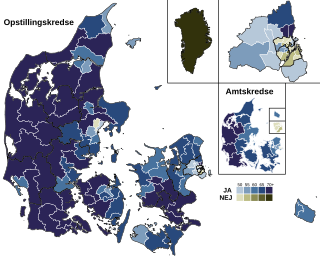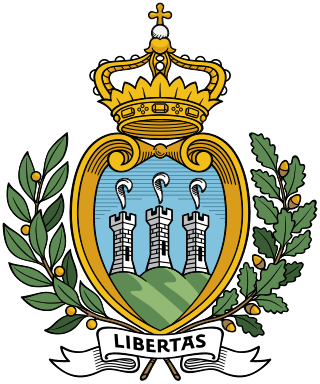The Greens of Andorra is a green political party in Andorra.

A referendum on joining the European Economic Community was held in Denmark on 2 October 1972. The result was 63.3% in favour with a turnout of 90.1%. The law that Denmark should be member of the EEC was passed on 11 October 1972, and Denmark became a member on 1 January 1973.

A referendum on the order law was held in Luxembourg on 6 June 1937. Voters were asked whether they approved of the new law, which would have banned any political party that sought to change the constitution or national legislation by violence or threats. The law would have resulted in the dissolution of the Communist Party, and became known as the Maulkuerfgesetz.

Parliamentary elections were held in Moldova on 25 February 2001. The result was a victory for the Party of Communists of the Republic of Moldova (PCRM), which won 71 of the 101 seats.

A referendum on the citizenship law was held in Latvia on 3 October 1998. The Saeima had made amendments to the law in June that increased the opportunities for naturalisation and provided the additional option of obtaining Latvian citizenship for non-citizens (nepilsoņi) and stateless persons (bezvalstnieki) born in Latvia from August 1991 onwards. Voters were asked "are you for or against the repeal of the law "Amendments in the Law of Citizenship"". A majority of 53.9% voted against repealing the law.
Elections to the Supreme Soviet were held in the Soviet Union on 18 March 1962.
Elections to the Supreme Soviet were held in the Soviet Union on 16 June 1974.
Elections to the Supreme Soviet were held in the Soviet Union on 4 March 1979.
A referendum on a new constitution and citizenship was held in Estonia on 28 June 1992. Voters were asked whether they approved of the new constitution drawn up by the Constitutional Assembly and extending suffrage to people registered as citizens. The new constitution was approved by 91.9% of voters, whilst the suffrage extension was rejected by 53.5%. Voter turnout was 66.8% for the constitution question and 66.7% for the suffrage question.
Parliamentary elections were held in Greece on 20 December 1881. Supporters of Charilaos Trikoupis emerged as the largest bloc in Parliament, with 125 of the 245 seats. Trikoupis became Prime Minister on 15 March 1882.
General elections were held in Italy on 27 January 1861, with a second round on 3 February. The newly elected Parliament first convened in Turin on 4 March 1861, where, thirteen days later, it declared the unification of the country as the Kingdom of Italy.

A referendum on the citizenship law was held in Latvia on 17 and 18 December 1927. Voters were asked whether they approved of repealing the amendments made to the citizenship law by the Saeima. The referendum was passed and the amendments were cancelled. Of a total of 1,120,026 registered voters, only 242,798 cast valid votes.

General elections were held in Liechtenstein on 25 March 1962. The Progressive Citizens' Party won eight of the 15 seats in the Landtag, but remained in coalition with the Patriotic Union. This was the first election contested by the Christian Social Party.

A referendum on the citizenship law was held in San Marino on 12 September 1999. Voters were asked whether the new citizenship law passed on 16 June should come into force. Although a majority voted in favour, the quorum of 32% of registered voters (9,663) was not achieved and the referendum failed.
Five referendums were held in Switzerland during 1922. The first three were held on 11 June on the process of obtaining Swiss citizenship, on expelling foreigners and on the eligibility of federal officials to stand in National Council elections. All three were rejected. The fourth was held on 24 September on an amendment of the criminal law regarding constitutional and domestic security, and was also rejected. The fifth was held on 3 December on introducing a one-off property tax, and was rejected by a wide margin.
Thirteen referendums were held in Switzerland during 2004. The first three were held on 8 February on a counter proposal to the popular initiative "for safe and efficient motorways" (rejected), an amendment to the Obligations (tenancy) law (rejected) and a popular initiative "life-long custody for non-curable, extremely dangerous sexual and violent criminals" (approved). The second set of three was held on 16 May on a revision of the federal law on Aged and Bereaved insurance, a federal resolution on financing the Aged and Bereaved insurance, and a federal law that would affect taxation for married couples, families, private housing and stamp duty, all of which were rejected.
Thirteen referendums were held in Switzerland during 1994. The first five were held on 20 February on federal resolutions on roadbuilding, continuing existing truck tolls and varying tolls based on engine power or mileage, as well as a popular initiative "for the protection of the alpine region from through traffic" and an amendment to the aeronautical law. All five were approved by voters. The second set of referendums was held on 12 June on federal resolutions on an article on the Swiss Federal Constitution on the promotion of culture and a review of the procedure for naturalising young immigrants, as well as a federal law on Swiss troops in peacekeeping operations. Whilst the resolutions were both approved by a majority of voters, they did not receive the approval from the majority of cantons, so were rejected, as was the law on troops.
The Estonian Socialist Workers' Party was a political party in Estonia.
Events in the year 1908 in Bulgaria.
Events in the year 1899 in Bulgaria.






